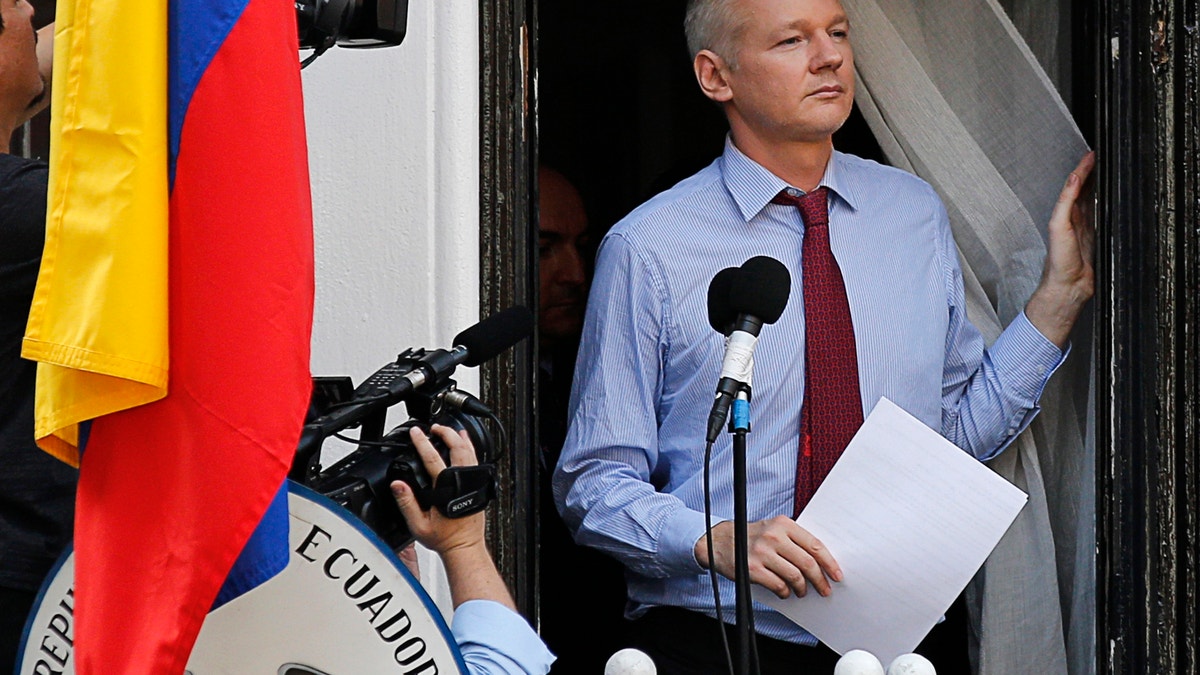
Wikileaks founder Julian Assange arrives to speak from the balcony of Ecuador's embassy, where he is taking refuge in London August 19, 2012. (Reuters)
The controversial Australian-born hacker-turned-free-speech advocate Julian Assange is the subject of Oscar-winning documentarian Alex Gibney’s latest film: “We Steal Secrets: The Story of WikiLeaks.”
Gibney and producer and former chairman of Universal Pictures Marc Shmuger trace the roots of Assange’s activism, starting with his teen years hacking various systems in the '80s to an arrest for entering government and business computers in the '90s, to the rise and demise of WikiLeaks, the website that paved the way for whistleblowers across the world to leak confidential documents while keeping their anonymity.
“I was attracted to the WikiLeaks tale because it was the classic David and Goliath story: one man, armed only with a computer, against the world. By creating a transparency machine, Julian Assange was going to hold governments and corporations to account,” Gibney said in his director’s statement. “It turns out the story was not about a machine; it was about human beings… It’s about the enormous power of governments – particularly the U.S. government – to hide crimes and corruption behind a vast expansion of official secrets. It’s about the way the U.S. government spies on us all – in part to protect us from enemies – but also inevitably to discover our secrets and to use them against us.”
The film also makes innumerable revelations of Assange’s mission, and how far he is willing to go even if it comes to endangering lives. One scene contains footage of an interviewer asking the silver-haired advocate if he uncovered information pertaining to how to leak the deadly Anthrax virus into a town’s water supply, would he publish it?
"Yes," Assange responded, without hesitation.
Gibney had to pull the film together without cooperation from its star. After months of negotiations over Assange’s potential cooperation, the director flew to England, where Assange under house arrest, to be told by the man himself he charges $1 million for interviews.
Only Gibney doesn’t pay.
One of the executive producers behind the film, British writer Jemima Khan, is an outspoken supporter of Assange who posted some of his bail when he was arrested on charges of sexual abuse. She functioned as something of a go-between for him and the production crew.
“Assange endlessly messed Alex around. He wanted extensive editorial control and ‘intel’ on other interviewees, which I knew Alex would never agree to,” she said. “In the end, it became increasingly difficult and negotiations broke down.”
“We Steal Secrets” also delves into the highly-publicized sexual abuses cases in Sweden, filed against him by two women. And while interview clippings from the likes of fellow activist Michael Moore imply it’s all the work of the U.S. governments to silence and discredit him, the bulk of Gibney’s investigation seems to conclude otherwise. At present, Assange remains under house arrest in England in an effort to avoid extradition to Sweden on the rape charges, and possible further extradition and prosecution over the exposure of classified U.S. documents.
While Assange is the focus of “We Steal Secrest,” he also shares the stage with another key character, Private Bradley Manning. The documentary paints him with great empathy, a sad and lonely young U.S. soldier and former intelligence analyst, the alleged source behind the scandalous government and military documents that put WikiLeaks into the global spotlight. Manning faces charges of violating the Espionage Act and aiding the enemy over the biggest leak of state secrets in U.S. history, as well as video of a 2007 Baghdad airstrike. In February, he pled guilty to 10 charges. The remaining twelve charges he faces carry a potential life sentence.
“He (Manning) has been very badly treated and it’s been really an outrage… The Obama administration and the military went after him and went after him hard,” Gibney said in a recent interview with movie website Collider. “Why? Because he was weak. They knew they could get away with it.”
Gibney’s documentary is already drumming up controversy in Hollywood circles. Director Oliver Stone is less than impressed, and took to Twitter last month to derail the film which was “not expected to be kind.”
“I don’t think most people in the U.S. realize how important WikiLeaks is and why Julian’s case needs support,” Stone said after meeting with the WikiLeaks founder at the Ecuadorian embassy in London, before slamming the American government. “(Assange) did much for free speech and is now being victimized by the abusers of the concept.”
Assange, who like Stone has reportedly not seen the film, has also denounced it. Other media experts argue that perhaps Assange shouldn’t be getting the Hollywood treatment at all.
“Julian Assange is no hero. Hollywood loves the idea of being subversive of the ‘military-industrial complex,’ so Julian Assange is a natural protagonist for them. In this case, though, Alex Gibney decided that Assange was more morally complex – beginning the minute he demanded payment to be interviewed for Gibney’s movie. Gibney and other leftists arrived at the reality that Assange is an egotist, not an idealist,” added Tim Graham, Director of Media Analysis for the Media Research Center. “Since Gibney couldn’t root for Assange in his movie, he made Bradley Manning the hero, and the scapegoat, insisting “the US government is trying to lay all the blame for these leaks on one poor kid.’ Other liberal journalists have easily found at least as much egotism and moral complexity in Manning as they have in Assange.”
Gibney was not available for further interview or comment.






